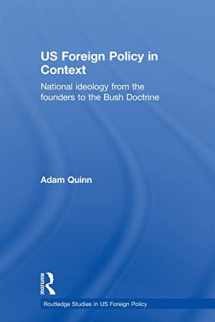
Us Foreign Policy in Context (Routledge Studies in US Foreign Policy)
ISBN-13:
9780415500524
ISBN-10:
0415500524
Edition:
1
Author:
Adam Quinn
Publication date:
2011
Publisher:
Routledge
Format:
Paperback
232 pages
FREE US shipping
Book details
ISBN-13:
9780415500524
ISBN-10:
0415500524
Edition:
1
Author:
Adam Quinn
Publication date:
2011
Publisher:
Routledge
Format:
Paperback
232 pages
Summary
Us Foreign Policy in Context (Routledge Studies in US Foreign Policy) (ISBN-13: 9780415500524 and ISBN-10: 0415500524), written by authors
Adam Quinn, was published by Routledge in 2011.
With an overall rating of 4.2 stars, it's a notable title among other
Child Psychology
(Psychology & Counseling, Child Psychology, Psychology, International & World Politics, Politics & Government) books. You can easily purchase or rent Us Foreign Policy in Context (Routledge Studies in US Foreign Policy) (Paperback) from BooksRun,
along with many other new and used
Child Psychology
books
and textbooks.
And, if you're looking to sell your copy, our current buyback offer is $0.3.
Description
This work blends strategic analysis of contemporary US foreign policy with long-term historical discussion, producing an important argument relevant to the debates surrounding both the merits of contemporary US foreign policy and the long-term trends at work in American political culture. Rather than a detailed historical study of the Bush administration itself, the book seeks to locate Bush within the historical context of the US foreign policy tradition. It makes the case for nationally specific ideological factors as a driver of foreign policy and for importance of interaction between the domestic and the international in the emergence of national strategy. The contemporary element focuses on critiquing the George W. Bush administration’s National Security Strategy, perceived by many as a radical and unwelcome ideological departure from past policy, and its broader foreign policy, concentrating especially on its embrace of liberal universalism and rejection of realism. This critique is supported by the cumulative argument, based upon the historical cases, seeking to explain American leaders’ persistent resistance to the prescriptions of realism. Quinn argues for some causal connection between historically evolved ideological constructions and the character of the nation’s more recent international strategy. Providing a valuable addition to the field, this book will be of great interest to scholars in American politics, US foreign policy and US history.


We would LOVE it if you could help us and other readers by reviewing the book
Book review

Congratulations! We have received your book review.
{user}
{createdAt}
by {truncated_author}


